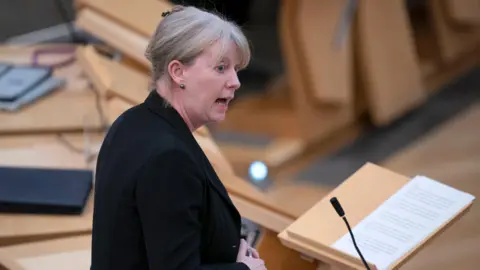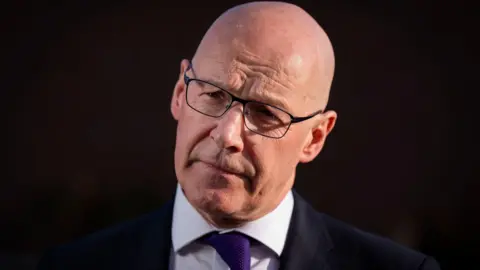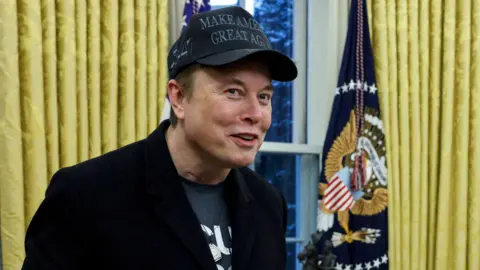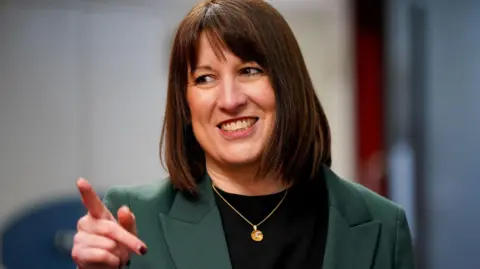Budget passed by MSPs after final Holyrood vote
 PA Media
PA MediaMSPs have approved the Scottish government Budget for 2025-26.
The minority SNP administration's spending plans were supported by the Greens, Liberal Democrats and Alba, while Labour MSPs abstained from the stage three ballot.
The government said the £63bn Budget would deliver a record settlement for the NHS and councils, fund a winter fuel payment for pensioners and help tackle child poverty.
But the Conservatives, the only party that voted against the plans, said it amounted to the "heaviest tax burden in the history of devolution".
The Budget Bill - which was passed by 73 votes to 29 - will now go through the formal process of receiving Royal Assent before it becomes an act of law.
The government's tax and spending plans will take effect from the start of the new financial year in April.
Finance Secretary Shona Robison said the budget had been developed through "effective engagement and negotiation across parliament".
She added: "It includes record NHS investment, social security spending to put money in the pockets of low-income families and action to effectively scrap the two-child benefit cap next year.
"We are delivering a universal winter heating payment for the elderly, providing record funding for local government and increasing investment in affordable housing."
Ahead of the vote, Robison tabled an amendment to the bill following the Scottish government's recent pledge to commit £25m to establish a just transition fund for Grangemouth.
The refinery, owned by Petroineos, is set to close by the summer with the loss of more than 400 jobs.
At the weekend, Prime Minister Sir Keir Starmer announced a further £200m investment in the Grangemouth site.
Robison also confirmed that up to £15m would be made available to the Scottish Funding Council to support universities experiencing financial difficulties.
She singled out the University of Dundee, which is facing a £30bn deficit.
The finance secretary welcomed the "spirited discussions" with the Greens, Lib Dems and Alba in the build-up to the vote and said the parties had shown a "pragmatic approach".
She added: "This is a Budget to improve services, tackle child poverty and build new opportunities but Labour, so far, will not back it."
Taxes 'too high'
Scottish Labour finance spokesman Michael Marra said the proposals were only possible after Chancellor Rachel Reeves delivered the "most progressive, redistribution budget in a generation".
But Scottish Conservative finance spokesman Craig Hoy criticised the proposals as he said taxes were "too high and too complex" and public services were "failing".
Meanwhile, Scottish Green finance spokesman Ross Greer welcomed measures to tackle the climate emergency and restore nature.
And Scottish Liberal Democrat leader Alex Cole-Hamilton said the Budget would deliver on priorities for his party, such as a new Belford Hospital in Fort William and help for babies born addicted to drugs.
 PA Media
PA MediaIt was not long ago that some speculated this year's budget process could be the undoing of the Scottish government.
The SNP administration lost its parliamentary majority after terminating a power-sharing agreement with the Greens, leading to Humza Yousaf's resignation as first minister.
His successor John Swinney was left relying on the help of opposition MSPs to pass his plans.
Securing such support was fraught with political danger. There was even a remote possibility of a snap election.
Any prospect of that was ended in January when Scottish Labour leader Anas Sarwar announced his party would not oppose the bill, meaning the SNP had the numbers they needed.
It was soon confirmed that Swinney, a seasoned Budget negotiator, had managed to win the support of the Greens, Liberal Democrats and Alba.
That did not stop him making eyebrow-raising claims that a failure to support his plans would be tantamount to supporting Elon Musk's "populist" agenda.
 Reuters
ReutersParliament has already agreed income tax rates for 2025-26, which it has to do before holding the final Budget debate and vote.
MSPs voted to increase the thresholds on lower tax bands in line with inflation.
This means the threshold of the basic band – a tax of 20% on earnings between £14,876 and £26,561 – and the intermediate band – a tax of 21% on earnings between £26,562 and £43,662 – will rise by 3.5%.
Despite most of the bands remaining static, more people will pay a higher rate of tax due to "fiscal drag". This happens when bands are not raised in line with increases in pay, meaning people are "dragged" into higher tax brackets.
Taxpayers earning below £30,300 will pay less income tax in Scotland than they would if they lived elsewhere in the UK. However, this will only amount to £28 per year for most in this group.
Those earning £50,000 will pay about £1,500 more per year in Scotland than they would elsewhere in the UK.
The plan was backed by all parties apart from the Conservatives, who said there was "no case" for Scotland having a more complex income tax system than the rest of the UK.
Finance Secretary Shona Robison said Scotland's tax system would raise a record £25bn in the coming financial year.
According to a Scottish Fiscal Commission forecast, Scotland will be £838m better off than it would have been if it was using the tax system in the rest of the UK.
What's in the Budget?
The headline announcement in Robison's Budget speech in December was a plan to effectively scrap the UK government's two-child cap on benefits north of the border.
Ministers have pledged to mitigate the cap from April 2026, or sooner if they are able.
However, they have not allocated any funds to the policy and are still in talks with the UK government about getting the data they need to pay affected families.
Ministers have promised an extra £2bn for the NHS and £1bn for local authorities, compared with the 2024-25 Budget.
The government also announced nearly £800m more for social security benefits, including funds to ensure every pensioner household gets a winter fuel payment.
Analysing the Budget, the Scottish Parliament Information Centre said the government had clearly chosen to support low earners, pensioners and tackle child poverty, but warned that "has the effect of squeezing other areas".
Ministers had to make concessions to the Greens and Lib Dems in return for their support. This included expanding eligibility for free school meals in eight council areas and extra funding for drugs and neonatal services.
There is also a 12% real terms increase in capital funding for infrastructure projects, as well as a £30m "invest to save" scheme to fund reform and improve efficiency.
Yet the Budget is not expected to deliver the kind of major reform ministers and bodies such as Audit Scotland have long agreed are urgently needed in the public sector.
 Reuters
ReutersFinancial headaches at Holyrood have been eased somewhat by a record funding settlement announced by UK Chancellor Rachel Reeves for the coming financial year.
But the situation has been complicated by the UK government's plan to increase employers' National Insurance from April.
Holyrood ministers estimate they will need about £550m to cover the increased costs for public sector workers, rising to £750m when indirect employees such as those in childcare, higher education or social care are included.
They have been told to expect about £300m in compensation from the Treasury - a figure Robison has called unacceptable.
The UK government has highlighted that the Scottish government chooses to have a proportionally larger and better-paid public sector than the UK as a whole.
To placate cash-strapped councils, Robison has pledged an additional £144m to cover 60% of the National Insurance costs.
Local authorities say this will leave them with a £100m shortfall, with several already announcing the biggest council tax increases in 20 years as a nationwide freeze comes to an end.
